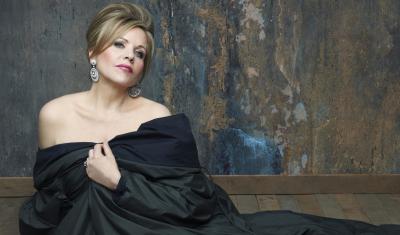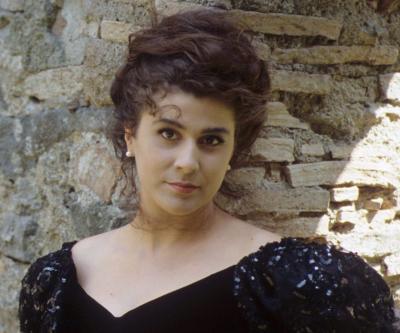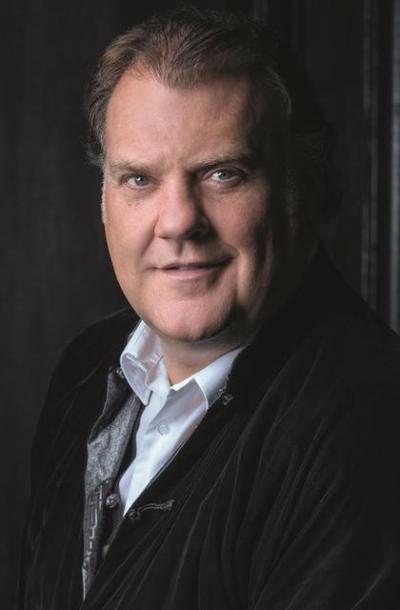Identify your Voice Type Based on your Personality
Have you been recently battling with yourself - should I be a tenor or a soprano? Let your personality help you decide! It’s no secret each voice type comes with some quirky and assumed behaviors. Even though voices are categorized using several characteristics from range to tessitura to color, how much does your personality factor in? To help determine your true voice type, here are the most common personality stereotypes of each major voice category.
Soprano

Photo: www.reneefleming.com
Though there are many subcategories of this voice type, we will focus on the personality traits of the common soprano.
1. Sopranos tend to be the ingenue and/or the leading role of operas. This voice type is either love-struck or dying (often both), so, naturally, sopranos tend to be dramatic in personality. How do you know if you have a dramatic personality? If one of the following scenarios has happened to you, odds are you're a drama queen, or at least a member of drama nobility:
- Has your boss's husband wanted to sleep with you before your wedding, so you conspired with your boss in an elaborate plot to trick him and save their marriage?
- Have you ever been a doll who fell in love with a human?
- Did your fiancé take off after a sexy mezzo?
- Did your villainous brother force you to marry a man you didn’t love?
If so, I've got news for you: you are a soprano.
2. Another famous soprano stereotype is being difficult to work with. Maybe it stems from having such a dramatic life. Do you always show up late to rehearsals with Starbucks in hand? Soprano.
3. Most notably, sopranos are extremely hard workers. They are the most common voice type in the audition circuit, so they always have to be at their best to succeed. Because of this, sopranos tend to be the most reliable, hardest working singers. If you practice constantly, are always thoroughly prepared, and are wholly dedicated to your craft, you’re probably a soprano.
Mezzo-soprano

Photo: www.ceciliabartoli.com
Unlike sopranos, mezzo-sopranos often do not have the starring role. Though there are many operas with significant mezzo roles, this voice type is more commonly known for having character roles that include witches, b*tches, and britches.
1. To determine whether you’re a mezzo, first ask yourself:
- Are you a witch?
- Do you often wear tall, pointy hats?
- Do you cackle when you laugh?
- Do you like to eat children?
If you’re a witch, or have witchy qualities, you’re probably a mezzo. But don’t get me wrong, witches have many redeeming characteristics. Witches tend to have a distinct sense of style. Some go for the sexy, all-black look. Others go for something more interesting and unique. If your style is unique, you might be a mezzo.
2. Secondly, are you a b*tch? This might be a hard question to answer. Here are some ways to tell:
- Have you ever made an innocent man fall in love with you and abandon his beliefs and then left him for another man?
- Did you ever cheat on your fiancé as soon as he left for war?
If you answered yes to at least one of these, you might be a mezzo.
3. Lastly, do you wear a lot of britches? Mezzos are known for often performing pants roles (male characters performed by female singers), so simply enough, if you like wearing pants, you might be a mezzo. Don't forget, women in pants equals power - Joan of Arc, anyone? Mezzos are powerful and strong women, so if you have these characteristics, you're definitely a mezzo.
Tenor

Photo: www.jonaskaufmann.com
Tenors, the highest male voice, are also the rarest voice type.
1. Because of this fact, tenors are cherished. In opera, there is usually at least one large tenor role, and sometimes it’s very hard to find a tenor to fill it. In choir, the tenor section tends to have the fewest number of singers – did any of you ladies have to sing tenor in high school? If you have ever been in a choir where your section is half the size of another section, you’re probably a tenor.
2. Another tenor characteristic is being loud. Tenors often have to sing extremely high notes with such brilliance that some liken it to pure loudness. If you have the ability to sing at a high frequency with sparkling resonance, you’re probably a tenor. Also, if you just like to talk loudly, but in a healthy way, you might be a tenor.
3. Many tenor characters are out to become heroes. Do you find yourself being heroic to save the one you love?
- Have you ever tricked your love’s guardian, who wanted to marry her for himself, into letting you marry her?
- Has your love ever fallen ill, so you pushed her away so she could afford her medical care?
- Have you ever fallen in love with somebody’s picture and decided to rescue her?
If you're a hero, you’re probably a tenor, and who doesn't want to friends with a hero?
Baritone

Photo: www.sherrillmilnes.com
Almost every opera has a leading baritone role, so baritones are able to show off many personality traits.
1. Baritones tend to enjoy flirting with ladies. Bull fighters seem to be especially lucky with the ladies; Escamillo was able to land the sexiest woman in opera. Falstaff is certainly not the most attractive man in opera, but he is quite cavalier in sending two ladies the same love letters. So, if you like flirting with the ladies, then you might be a baritone.
2. Though baritones tend to be studs, they also have an evil streak.
- Have you ever been in a position of power and wanted to be with a famous singer, but she was in love with somebody else, so you threatened to kill him?
- How about that time your friend passed you over for a job, so you decided to deceive and manipulate him until he commits a murder-suicide?
If any of these scenarios seem familiar, you might be a baritone.
3. Finally, baritones can be romantic. One of the most hopelessly romantic characters in opera is Papageno. He is a professional bird catcher, but he’s really just trying to catch a lady. Though Guglielmo may not be the most romantic of opera characters, he believes so strongly in his fiancé that he’s willing to let his friend try to seduce her. If you have a bit of a romantic side, you might be a baritone.
Bass

Photo: www.harlequin-agency.co.uk
Basses, the lowest voice type, are extremely important both as soloists and as choristers, but they usually don't get the melody or the leading role.
1. In choir, the basses are known as the most easygoing section. Whereas other voice types seem to be more finicky, basses make singing look so easy. They just open up their mouths and let that low sound resonate.
2. Basses also have the reputation of being funny, and the buffo bass is a popular character in many operas. This comedic role is important for comic relief as well as advancing the plot. Buffo basses often require great acting skills and are able to handle a lot of patter singing. The singing parts of buffo roles are usually a little higher than other bass parts and can also be sung by baritones. If you have great comic instincts, you might be a bass.
3. Though basses can be funny, they also have strong and powerful voices. They often sing mighty roles in positions of power. Characters in power roles, for better or for worse, include Sarastro, Mephistophèles, and Il Commendatore, to name a few. So, if you enjoy being powerful and mighty, you’re probably a bass.
Each of the main voice types has several stereotypes and personality traits associated with them. Of course, you can break out of the mold and be a soprano who isn’t difficult or a bass who isn’t funny. Whatever your personality, be sure to sing the roles you are most comfortable singing so your voice can shine.








